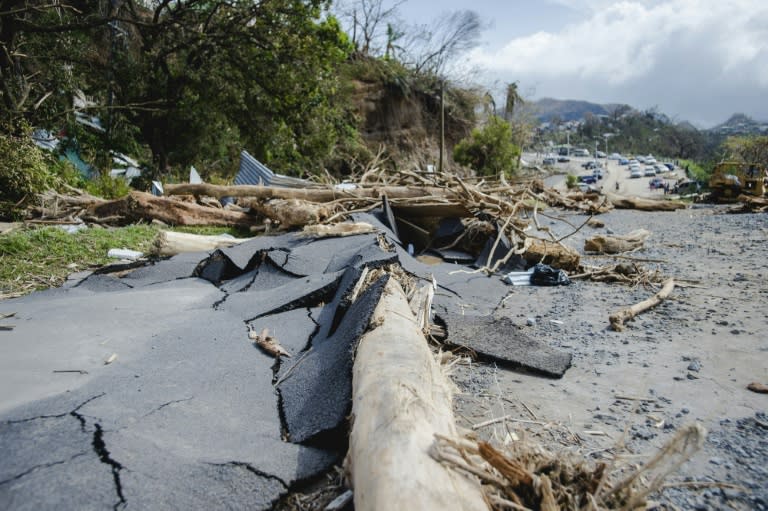In Dominica, islanders stand strong despite chaos
It's been less than a week since Hurricane Maria largely destroyed the Caribbean island of Dominica -- but despite cut-off supplies and extreme conditions, its inhabitants remain optimistic in the face of devastation. Maria killed 15 people when it tore through the "Nature Island" -- population 72,000 -- as a Category Five storm, leaving its once-luscious green mountains stripped to dirt. Ferry services between Dominica and the nearby French islands Guadeloupe and Martinique resumed Friday. On one leaving Pointe-a-Pitre, Guadeloupe, passengers witnessed the extent of the damage -- including roofs torn away and hilltops battered by the torrential rain. One man, Jean-Luc Royer, travelled with supplies including water sterilization tablets for his family, who contacted him by radio. At the island's only functioning port, in the capital Roseau, a few weary-looking people waited in the hope of leaving Dominica, and to ask about conditions on other islands. But the usual stream of taxis was nowhere to be seen. Clumps of wires, sheet metal and wood, along with diminishing gas supplies have made road travel impossible -- replaced by lines of pedestrians fetching food and water. There is no running water, no electricity and limited telecommunication, with a curfew in place between 4 pm and 8 am. -'Nobody comes to help us'- Meanwhile, the island's stadium is now a heliport for aircraft circling over the island. Soldiers from the Netherlands and St Lucia, United Nations personnel, Venezuelan rescuers and firemen from Martinique patrol on the ground. A team from Medecins Sans Frontieres from Haiti is also evaluating medical needs -- with Dominica's injured currently treated in the partially destroyed hospital's corridors. "The whole country has been devastated. People are still in a shell shock because there is a lot of stress on them. It's a sudden change of life," said Deputy Prime Minister John Collin McIntyre, adding that 90 per cent of Dominica's houses are "compromised." Schnyler Esprit, in charge of logistics at Dominica State College, said Maria was "a hundred times worse than Erika", which killed 30 people in 2015. "Erika was violent but very localized. This is widespread. Everything is disorganized. I'm afraid we are going to lack food and water very soon. I heard the Red cross have been looted, some supermarkets have been looted, too," he said. But despite the chaos, not a single Dominican that AFP came across complained. "Dominica is strong, we will rise again!" said Christina Morancy, from the disadvantaged community of Newtown, near Roseau. In Roseau itself, a large warehouse of building materials was ripped open as people try to rebuild what they can. Unlike French-Dutch St Martin, Dominica is an impoverished island, with few shops to loot. "Here, it is every man for himself, nobody comes to help us. It's survival," said George Elyzee, 86, whose home was flooded but kept its roof. "It is as if you were in Syria," said Casimir Augustus, president of the Dominican Association in Guadeloupe, who came to the island to confirm if his aunt "is still alive". But even he remains optimistic, adding, "Come back in six months, you will see."



